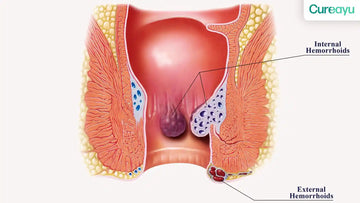Hemorrhoids, often an uncomfortable and painful condition, can significantly impact daily life if left untreated. Understanding the symptoms, causes, and treatments for hemorrhoids is essential for early diagnosis and effective management. This blog delves deep into the nature of hemorrhoids, their symptoms, causes, and various preventive and treatment options.
Hemorrhoids, also known as piles, are swollen veins in the rectum and anus that can cause discomfort, pain, and bleeding. This condition is common, affecting millions worldwide, especially adults over the age of 30. Despite being a prevalent issue, the stigma surrounding hemorrhoids often prevents people from seeking timely medical help. The symptoms of hemorrhoids can range from mild irritation to severe pain and bleeding, depending on their severity and type. With the right information, you can identify the signs early and take necessary precautions to prevent them. This blog explores everything you need to know about hemorrhoids, their symptoms, and how to manage and treat them effectively.
Also Read: The Difference Between Piles and Fissure: Symptoms, Causes, and Treatments
What Are Hemorrhoids?
Hemorrhoids are swollen or inflamed veins in the lower rectum and anus, similar to varicose veins. These can develop inside the rectum (internal hemorrhoids) or under the skin around the anus (external hemorrhoids).
They occur when excessive pressure is exerted on the veins in the rectal and anal region, causing them to stretch and swell. Factors like straining during bowel movements, pregnancy, obesity, or prolonged sitting can contribute to their development. Hemorrhoids are classified into two main categories: internal and external.
Types of Hemorrhoids
1. Internal HemorrhoidsInternal hemorrhoids develop inside the rectum and are usually not visible. These are typically painless but may cause rectal bleeding during bowel movements. In severe cases, internal hemorrhoids may prolapse, meaning they protrude outside the anus, causing pain and irritation.
2. External Hemorrhoids
External hemorrhoids form under the skin around the anus. They are visible and can cause significant discomfort, including itching, pain, and swelling. In some cases, a blood clot may form within the hemorrhoid (thrombosed hemorrhoid), leading to severe pain and a hard lump near the anus.
3. Thrombosed Hemorrhoids
Thrombosed hemorrhoids are external hemorrhoids with a blood clot, resulting in intense pain, swelling, and inflammation. They often require medical intervention for relief.
Also Read: Navigating Dietary Choices: Essential Foods to Avoid in Piles for Better Digestive Health
Hemorrhoids Symptoms
1. Rectal BleedingOne of the most common symptoms is bright red blood during or after bowel movements. This blood is often seen on toilet paper or in the toilet bowl.
2. Itching or Irritation Around the Anus
Hemorrhoids can cause persistent itching or irritation in the anal region, especially with external types.
3. Pain or Discomfort
While internal hemorrhoids are usually painless, external hemorrhoids can cause significant pain, particularly during bowel movements.
4. Swelling Around the Anus
External hemorrhoids may lead to visible swelling or lumps around the anal area.
5. Protrusion or Prolapse
In severe cases, internal hemorrhoids may prolapse and protrude outside the anus, leading to discomfort and difficulty with hygiene.
Also Read: A Comprehensive Guide to Piles: Best Foods and Diet for Treatment
Hemorrhoids Causes
1. Chronic Constipation or DiarrheaStraining during bowel movements or frequent diarrhea puts pressure on rectal veins, increasing the risk of hemorrhoids.
2. Prolonged Sitting or Standing
Sitting or standing for extended periods can slow blood flow in the rectal veins, contributing to hemorrhoid development.
3. Pregnancy
During pregnancy, the growing uterus exerts pressure on rectal veins, leading to hemorrhoids.
4. Obesity
Excess body weight increases pressure on the pelvic veins, a common risk factor for hemorrhoids.
5. Low-Fiber Diet
Diets lacking sufficient fiber result in hard stools, requiring more straining during bowel movements.
Prevention Tips for Hemorrhoids
- Eat a High-Fiber Diet: Incorporate fruits, vegetables, whole grains, and legumes to ensure soft stools and easier bowel movements.
- Stay Hydrated: Drink plenty of water throughout the day to keep stools soft and prevent constipation.
- Exercise Regularly: Physical activity promotes healthy digestion and prevents constipation.
- Avoid Straining: Don’t force bowel movements; use the toilet only when necessary.
- Limit Sitting Time: Take breaks from prolonged sitting, especially on the toilet, to reduce rectal vein pressure.
Hemorrhoids Treatment
- Home Remedies
- Warm Sitz Baths: Sitting in warm water for 10-15 minutes can relieve discomfort.
- Topical Treatments: Over-the-counter creams and ointments provide temporary relief.
- Medications
- Pain Relievers: Non-prescription painkillers like ibuprofen can help reduce pain and inflammation.
- Laxatives: Stool softeners ease bowel movements, minimizing strain.
- Minimally Invasive Procedures
- Rubber Band Ligation: This procedure involves tying a rubber band around the base of an internal hemorrhoid to cut off its blood supply.
- Sclerotherapy: A solution is injected into the hemorrhoid, causing it to shrink.
- Surgical Treatments
- Hemorrhoidectomy: A surgical procedure to remove severe or recurrent hemorrhoids.
- Stapled Hemorrhoidopexy: This technique removes the prolapsed hemorrhoid and repositions the tissue.
Conclusion
Hemorrhoids, while common, can be managed effectively with timely intervention and proper care. Recognizing the symptoms early and addressing the underlying causes can prevent complications. Whether it's adopting a high-fiber diet, staying hydrated, or exploring treatment options like minimally invasive procedures, relief from hemorrhoids is achievable.
By taking proactive measures and consulting a healthcare professional when needed, you can significantly improve your quality of life. Remember, there's no need to suffer in silence—addressing hemorrhoids promptly can restore comfort and peace to your daily routine.











